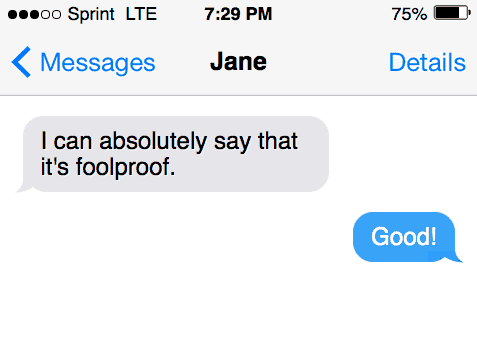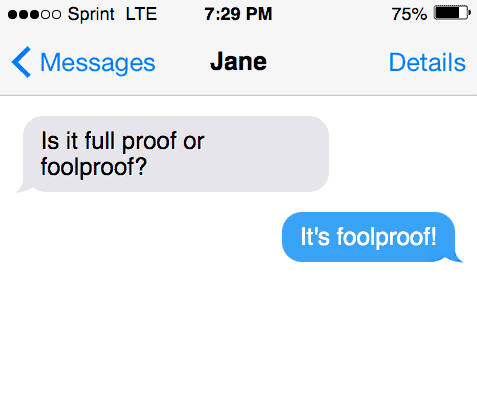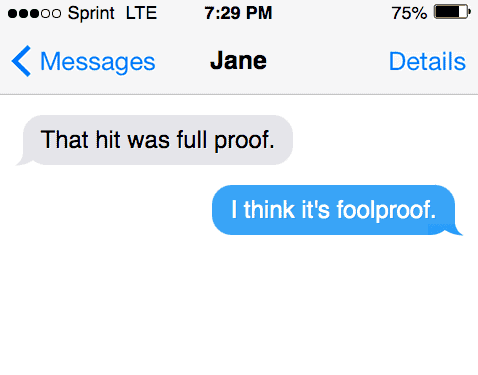Is it full proof or fullproof? Or is it foolproof? If I want to say, “the foolproof way,” how do I say this grammatically correct? The English language can be complicated to write. This short guide will help clear the confusion on the phrase “foolproof.”
Full proof, fullproof vs. foolproof: what’s the difference?
The difference is that foolproof is right, and full proof and/or foolproof is wrong. Full proof is a mistake and does not exist as a phrase or term in English.
Foolproof, on the other hand, is a common phrase and adjective when describing a plan (or system or scheme) as being infallible, or not likely to fail/go wrong.
The term foolproof is a compound word that combines two (separate) words to create a new one. Fool and proof are conjoined (literally) to form the distinct phrasefoolproof, which has a different meaning from either of the single words, ‘fool’ and ‘proof.’

MINI LESSON:
A quick, mini-lesson on compounds (which will aid in understanding this article’s main focus on the term foolproof). English includes tons of compound words. Take a look at these extremely common compound words:
- Blueberry (blue/berry)
- Aircraft (air/craft)
- Backhand (back/hand)
- Grandchildren (grand/children)
- Heirloom (heir/loom)
- Forearm (fore/arm)
- Kneecap (knee/cap)
In each of the above compounds, two or more independent words combine to create a new term or phrase (which is not captured by either word individually).
Compound words are extremely common, so it’s certainly worthwhile to take the time to become familiar with them. Practice identifying common compounds in writing whenever they appear.
What does foolproof mean?
What does it mean for something to be foolproof? To describe a plan, scheme or system as foolproof is essentially saying it is incapable of going wrong or failing.
To have a ‘foolproof’ plan, for example, is to describe it as being extremely dependable. Its level of effectiveness is such that even a fool could do it (the plan is fool-and-idiot-resistant, so to speak).
Perhaps it would be more fitting to describe it as a ‘no-brainer’ (though these are not interchangeable terms, so try not to confuse them with each other).

Understanding the meaning of ‘foolproof’
To get a better idea of the meaning of foolproof, try separating the two words that make up the compound from each other. According to the dictionary definition, a fool is a person that is unwise or acts imprudently; “a person lacking in judgment or prudence.” (Merriam-Webster). ‘Proof‘ is defined in the dictionary as “something that induces certainty or establishes validity.”
Modifying the compound into an individual, the single word does not immediately help to clarify the meaning of foolproof; instead, it’s in the compounding (or conjoining) of these words that form the new word with its distinct meaning. Compounds, in this sense, carry different meanings from the individual words that make up the compound word.
Bonus Fact! The word ‘proof’ is also used in the alcohol industry to measure ethanol’s content in alcoholic beverages and spirits. Alcohol proof, also referred to as ABV, is an abbreviation for alcohol by volume and has become the more common/popular way to refer to the amount of alcohol in liquors. For example, in a spirit or whiskey, say bourbon, the percentage displayed on the bottle refers to its alcohol proof/ABV.
How to use foolproof in a sentence
These sentences show how to use foolproof in a sentence:
✔️ Correct: The politician felt his campaign was foolproof.
❌ Incorrect: None of these options are full proof.
✔️ Correct: None of these options are foolproof.
❌ Incorrect: They wrote the instructions so they would be full proof.
✔️ Correct: They wrote the instructions so they would be foolproof.
❌ Incorrect: A bowl of cereal is a full proof breakfast recipe.
✔️ Correct: A bowl of cereal is a foolproof breakfast recipe.
Does foolproof need a hyphen?
Is foolproof one word or two? This is a tricky question because, technically, all compound words are made up of two or more words.
However, in terms of spelling, the word foolproof is usually written as one word.
Sometimes it will appear as two words with a hyphen (-); though this is not required spelling, it’s not a spelling error.
As it stands, fool-proof, foolproof, and fool proof are technically all acceptable ways to spell the word foolproof.
Synonyms of foolproof
Synonyms are words/phrases/terms that share similar meanings with other terms. To eliminate repetitiveness in writing or to add some variety/flair, synonyms are immensely valuable in writing.
Numerous synonyms share similar meanings to foolproof, which can communicate the same concept or idea. Consider these synonyms for the term foolproof:
- Tried and true:“Our tried and true formula works every time to cure headaches.”
- Trustworthy: “The security system we have installed in our office is trustworthy.”
- Airtight: “The suspect’s alibi was airtight and without flaw.”
- Tried and tested: “The toaster is the tried and tested way of making toast.”
- Goofproof: “Their plan wasn’t goofproof, but it was their best plan yet.”
- Guaranteed: “Susan guaranteed that it would all go according to plan.”
- Surefire: “Touching a hot stove is a surefire way to get burned.”
- Unfailing: “We had the unfailing support of the entire medical team at our side.”
- Unerring: “Ashley is unerring in her ability to recognize the moral course of action.”
- Faultless: “Her writing was faultless.”
- Flawless: “The ballet company gave a flawless performance.”
- Infallible: “Some people think they’re infallible, but, in reality, no one is infallible.”
- Unfailing: “Sarah’s unfailingly positive attitude made her popular with her coworkers.”
- Idiot-proof: “The game’s instructions are idiot-proof.”
Antonyms for foolproof
Antonyms are words that have a directly opposite meaning compared to other words.
ORIGINS OF FOOLPROOF:
The word ‘fool‘ is believed to have originated from the Old French, fol, meaning a “madman, insane person, idiot, jester.” As the French language derives from Latin, the original word in Latin is believed to be follis, which is an adjective that translates to “mad, insane.”
‘Proof‘ derives from the Old French proeve, prueve, meaning “proof, test, experience.” This term was passed down originally from Latin proba, “a proof.”

The lesson in review
A bite-sized summary of this lesson in three bullet points:
- The term is foolproof (not full proof or fullproof).
- Full proof and/or fullproof are spelling errors, and not recognized terms.
- To say something is foolproof means it is impervious to fail or mess up.
Sources
- Definition of Compound word: wikipedia.org
- Definition of Fool: merriam-webster.com
- Definition of Proof: merriam-webster.com
- Definition of heirloom: merriam-webster.com/dictionary/heirloom
- Definition of adjective: merriam-webster.com/dictionary/adjective
- Article on components of a sentence: evansville.edu
- Article on introductory clause: grammarly.com
Inside this article
Fact checked:
Content is rigorously reviewed by a team of qualified and experienced fact checkers. Fact checkers review articles for factual accuracy, relevance, and timeliness. Learn more.
Core lessons
Glossary
- Abstract Noun
- Accusative Case
- Anecdote
- Antonym
- Active Sentence
- Adverb
- Adjective
- Allegory
- Alliteration
- Adjective Clause
- Adjective Phrase
- Ampersand
- Anastrophe
- Adverbial Clause
- Appositive Phrase
- Clause
- Compound Adjective
- Complex Sentence
- Compound Words
- Compound Predicate
- Common Noun
- Comparative Adjective
- Comparative and Superlative
- Compound Noun
- Compound Subject
- Compound Sentence
- Copular Verb
- Collective Noun
- Colloquialism
- Conciseness
- Consonance
- Conditional
- Concrete Noun
- Conjunction
- Conjugation
- Conditional Sentence
- Comma Splice
- Correlative Conjunction
- Coordinating Conjunction
- Coordinate Adjective
- Cumulative Adjective
- Dative Case
- Determiner
- Declarative Sentence
- Declarative Statement
- Direct Object Pronoun
- Direct Object
- Diction
- Diphthong
- Dangling Modifier
- Demonstrative Pronoun
- Demonstrative Adjective
- Direct Characterization
- Definite Article
- Doublespeak
- False Dilemma Fallacy
- Future Perfect Progressive
- Future Simple
- Future Perfect Continuous
- Future Perfect
- First Conditional
- Irregular Adjective
- Irregular Verb
- Imperative Sentence
- Indefinite Article
- Intransitive Verb
- Introductory Phrase
- Indefinite Pronoun
- Indirect Characterization
- Interrogative Sentence
- Intensive Pronoun
- Inanimate Object
- Indefinite Tense
- Infinitive Phrase
- Interjection
- Intensifier
- Infinitive
- Indicative Mood
- Participle
- Parallelism
- Prepositional Phrase
- Past Simple Tense
- Past Continuous Tense
- Past Perfect Tense
- Past Progressive Tense
- Present Simple Tense
- Present Perfect Tense
- Personal Pronoun
- Personification
- Persuasive Writing
- Parallel Structure
- Phrasal Verb
- Predicate Adjective
- Predicate Nominative
- Phonetic Language
- Plural Noun
- Punctuation
- Punctuation Marks
- Preposition
- Preposition of Place
- Parts of Speech
- Possessive Adjective
- Possessive Determiner
- Possessive Case
- Possessive Noun
- Proper Adjective
- Proper Noun
- Present Participle
- Prefix
- Predicate



